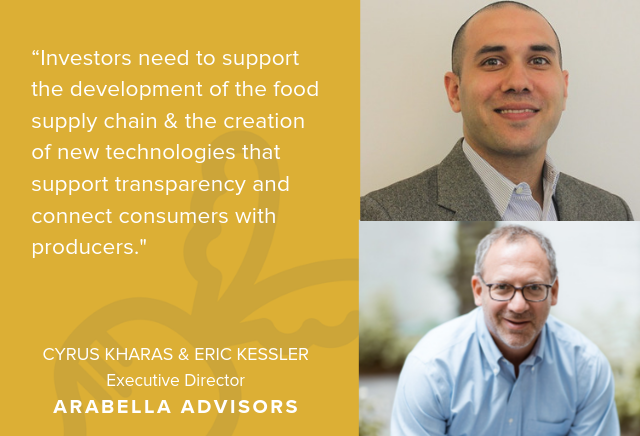
Food+Tech Connect and The Future Market are hosting Biodiversity: The Intersection of Taste & Sustainability, an editorial series featuring interviews with over 45 leading food industry CEOs, executives, farmers, investors and researchers on the role of biodiversity in the food industry. Read all of the interviews here.
As we’ve talk about in this series, capital is critical to building a more biodiverse food system. One organization at the forefront of driving capital to this space is Arabella Advisors, an advisory that helps its clients develop food system, conservation and climate change related philanthropic and policy strategies. They also lead Good Food Ventures, an investment club that sources and diligences transformative market-based solutions.
Below, I speak with Eric Kessler, founder, principal and senior managing director, and Cyrus Kharas, associate director, about why we need greater investment in technologies that support transparency, supply chain innovation and connect eaters to the producers of their food.
___________________________
Danielle Gould: Why is biodiversity a priority for Arabella Advisors?
Cyrus Kharas & Eric Kessler: Many of our clients dedicate a tremendous amount of attention, effort and resources to making sure our food systems are healthy and sustainable – and biodiversity is a meaningful component of that. For example, some of our projects have involved supporting sustainable biofertilizer development, clean-meat products and policy initiatives that advance a healthy more biodiverse planet.
DG: How does your organization define and think about biodiversity? What does an ideal biodiverse food system look like? How do you measure biodiversity, and when will we know when we’ve arrived at a “good” level of biodiversity?
CK & EK: We believe a more biodiverse food system will be one that provides more diverse and ecologically sensitive food choices. Within Arabella’s food systems work, we see how the variability among animal and plants results in healthier, more sustainable and more resilient food systems that can serve the needs of all communities. We measure biodiversity by the number and range of living beings and how well an ecosystem can withstand shocks, such as those resulting from climate change. It isn’t clear necessarily how we will know when we have reached a sufficient level of biodiversity, but what is certainly clear is that pursuing it needs to be a priority.
DG: What is your organization doing or planning to do to promote biodiversity?
CK & EK: As philanthropic advisors, we help our clients build grant-making portfolios and policy agendas that target specific food system, conservation and climate goals. In addition, we spearhead Good Food Ventures, an investment club that sources, conducts due diligence on and presents transformative market-based solutions to investors who are interested in contributing to a healthy and sustainable food system. The companies in which our clients invest are for-profit companies that aim to achieve strong financial and environmental impacts – often with an explicit focus on biodiversity.
DG: What is the business case for products that promote a more biodiverse food system?
CK & EK: The market has shown that the economic case for healthier foods sourced from sustainable locations via transparent and humane practices is strong and growing. If we think about how niche an organic market was 20 years ago versus the prevalence of organic produce and markets today, the trend is incredible. The markets for organic or local produce, grassfed proteins, fair-trade coffee and chocolate, and other products have emerged and grown is all an investor needs to see to understand the value the market is putting on environmental and social values like biodiversity.
DG: What investments need to be made to create a more biodiverse food system?
CK & EK: Investors need to support the development of the food supply chain and the creation of new technologies that support transparency and connect consumers with producers. It will be critical for entrepreneurs to effectively and efficiently reach the end consumer, which makes supply chain developments for small-scale farmers or innovative clean-protein products essential. Investments in technologies – ranging from biofertilizers to enablement software to get products in front of consumers – will be critical at each juncture of the supply chain to ensure an efficient market that can support businesses that have recognized the importance of biodiversity in their business model.
DG: How might we reinvent capital structures or create incentives to create more investment in biodiversity?
CK & EK: We already see great momentum in the investment world concerning biodiversity and healthy food systems. For one, there is much more money, attention and talent focusing on the sector. Naturally, that activity leads to competition, innovation and creative solutions. Demographic trends also drive more visibility of market opportunities in the broader food system. For example, many people understand that global population growth will require improved efficiency in food production and delivery. Cutting-edge companies are now exploring cost-effective ways to develop proteins to feed the growing population using controlled and sustainable methods, and investors have noticed.
We can also continue to look at technology for ways to reinvent capital or incentives for investment to drive improved biodiversity. With new technology, consumers can track where their food comes from and how it gets to them. This transparency will allow open and efficient markets to determine the supply/demand dynamics for products that build a focus on biodiversity into their model.
DG: What are some of the most important things investors, food manufacturers, retailers and other key actors across the supply chain can do to support biodiversity?
CK & EK: Investing and adopting new technologies will be critical, particularly when it comes to creating a supply chain that encourages a more biodiverse food system. Investors can also encourage consumers to make purchasing decisions that account for biodiversity, sustainability, fair treatment of workers and other social and environmental issues by supporting education and messaging. Finally, all of these actors should continue to promote the importance of biodiversity in their business and provide additional momentum for businesses that recognize and incorporate that awareness into their business models.
DG: What exciting products, technologies or services are you seeing that support a more biodiverse food system?
CK & EK: We see hundreds of companies, products, technologies and services that are working to serve communities better, healthier and more environmentally sustainable foods. As mentioned earlier, clean-proteins or plant-based meat alternatives are a huge opportunity for the market. Entrepreneurs are also addressing the food retailers, grocers, restaurants, campuses and even other food-product producers waste and how that food can be repurposed or transformed into useful products. While these products may not directly promote biodiversity, their business models reduce our dependence on products that degrade biodiversity and the environment.
DG: Are there certain products you would like to see more of in the food industry that would help promote a more biodiverse agricultural system?
CK & EK: Clean proteins, local produce, more diversity within food and produce categories and more seasonality are all trends that we would like to see and would immediately contribute to a more biodiverse agriculture system. Part of what will support a more biodiverse agriculture system is a more transparent supply-demand dynamic for new and diverse food.
DG: What is your vision for what a more biodiverse food system looks like in 10-15 years?
CK & EK: In 2030, consumers will know exactly where their local produce comes from and how it is grown and will be able to make informed decisions about what they eat and what types of producers and farmers they purchase it from. And the benefits of each incremental step toward greater biodiversity will cascade. We will experience cleaner air and water. We will have safer food void of contaminants. Our farmers will have more dependable incomes. Food desert communities will be extinct. And on and on.
DG: Anything else you want to share?
CK & EK: We see many equally important channels investors can support to make true biodiversity reality: important nonprofit service providers, critical research endeavors, innovative entrepreneurs, influential advocates and more. At Arabella we will continue to champion these efforts to drive the change we all want to see in our food system and in our communities.
Read all of our biodiversity interviews here and learn more about Biodiversity at The Future Market.
______________________
 Cyrus Kharas, Associate Director at Arabella Advisors
Cyrus Kharas, Associate Director at Arabella Advisors
Cyrus Kharas is an associate director on the Impact Investing team at Arabella. He works across a broad range of Arabella’s individual, institutional, and corporate clients, and contributes to the firm’s analysis of trends and opportunities in the impact investing field. He has substantial experience in economics, international development, capital markets, and social impact, and brings this expertise to support projects across Arabella. In his time at Arabella, Cyrus has managed several projects ranging in focus from capital markets dynamics for minority and female entrepreneurs to climate change initiatives. Cyrus is driven to find creative ways to unlock philanthropic and private capital to solve global challenges.
Prior to joining Arabella Advisors, Cyrus spent several years at Goldman Sachs in the investment management division, where he focused on cross-asset class allocation and portfolio strategy. His team focused on institutions and the current and retired partners of Goldman Sachs. Previously, he was an analyst at Calvert Impact Capital, where he designed and managed portfolios of impact investments for institutional clients with specific impact goals. He participated in the underwriting and presenting of investments to the clients, as well as ongoing financial and impact monitoring of the portfolio. Cyrus began his career at the US Treasury Department in the Office of International Affairs.
Cyrus serves on the junior board of the New York City-based Advocates for Children, a nonprofit organization dedicated to representing disadvantaged kids in the NYC school system. He has a BA from Tufts University in psychology and economics and an MBA with a concentration in economics from NYU Stern School of Business. Cyrus is an avid soccer player and fan. He lives in Brooklyn with his wife and daughter.
 Eric Kessler, Founder, Principal and Senior Managing Director of Arabella Advisors
Eric Kessler, Founder, Principal and Senior Managing Director of Arabella Advisors
Eric is a serial entrepreneur who has started, led, and advised organizations pursuing social change across the country and around the globe. As founder of Arabella Advisors, Eric has been at the forefront of innovation and impact in the philanthropic sector during one of its greatest historical expansions.
While guiding Arabella from a small startup to a company with more than 160 employees that advises on several billion dollars of philanthropic resources annually, Eric has focused on helping clients achieve their philanthropic goals by devising grant-making strategies, mounting effective advocacy campaigns, evaluating impact, and managing their foundation’s operations. In addition to serving a broad range of family, institutional, and corporate clients, Eric leads the firm’s work with clients who are working to improve our food system through policies and business investments that promote nutritious, sustainable, and affordable food.
Eric’s interest in the food sector extends well beyond his work at Arabella. He chairs the committee at the James Beard Foundation that oversees efforts to engage the culinary community in advocacy on food policy, and he created the foundation’s Chefs Boot Camp for Policy and Change. Eric also co-founded the Chef Action Network and has a personal private equity portfolio invested in businesses at the forefront of improving our food system. And, he proudly serves as an appointed member of Washington, DC’s Food Policy Council.
In addition to his work at Arabella, Eric founded and serves as secretary of the New Venture Fund, a nonprofit that incubates new social sector innovations, and co-founded the Center for Disaster Philanthropy.
Eric is on the boards of the James Beard Foundation and the National Democratic Institute. He is a member of the Young Presidents’ Organization and Summit Series. He also serves as a trustee of his own family’s foundation, which holds assets generated by the sale of a fifth-generation family-owned business.
Eric holds an Executive MBA from Georgetown University and a BA from the University of Colorado.





